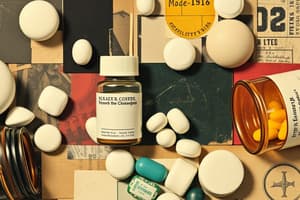Podcast
Questions and Answers
What type of medication is indicated by the suffix -dipine?
What type of medication is indicated by the suffix -dipine?
- Anticoagulant
- Calcium Channel Blocker (correct)
- Proton Pump Inhibitor
- Beta Blocker
What is the common use for medications that end with -afil?
What is the common use for medications that end with -afil?
Erectile dysfunction
What is the primary action of ACE inhibitors with the suffix -pril?
What is the primary action of ACE inhibitors with the suffix -pril?
Block the conversion of angiotensin I to angiotensin II
Which suffix indicates a class of sedative-hypnotic medications?
Which suffix indicates a class of sedative-hypnotic medications?
What type of drug is indicated by the suffix -statin?
What type of drug is indicated by the suffix -statin?
What is the common side effect associated with corticosteroids indicated by the suffixes -asone, -solone, -onide?
What is the common side effect associated with corticosteroids indicated by the suffixes -asone, -solone, -onide?
What therapeutic effect do beta blockers with the suffix -olol have?
What therapeutic effect do beta blockers with the suffix -olol have?
What infections are typically treated with penicillin, which ends with -cillin?
What infections are typically treated with penicillin, which ends with -cillin?
What type of medication is indicated by the suffix -ide?
What type of medication is indicated by the suffix -ide?
Which suffix indicates proton pump inhibitors?
Which suffix indicates proton pump inhibitors?
What is the effect of thrombolytics with the suffix -ase?
What is the effect of thrombolytics with the suffix -ase?
What condition do antiemetics with the suffix -azine treat?
What condition do antiemetics with the suffix -azine treat?
What class of medications is indicated by the suffix -phylline or -terol?
What class of medications is indicated by the suffix -phylline or -terol?
What type of drug is represented by the suffix -arin?
What type of drug is represented by the suffix -arin?
What does the suffix -tidine indicate?
What does the suffix -tidine indicate?
What class of medications does the suffix -zine refer to?
What class of medications does the suffix -zine refer to?
What is the general classification of drugs with the suffixes -cycline or -floxacin?
What is the general classification of drugs with the suffixes -cycline or -floxacin?
Flashcards are hidden until you start studying
Study Notes
Common Drug Class Suffixes
-
-dipine: Calcium channel blockers that facilitate arterial dilation, reducing blood pressure. Indications include angina and hypertension; side effects may include constipation, reflex tachycardia, and peripheral edema. Examples: nifedipine, verapamil, diltiazem.
-
-afil: Medications for erectile dysfunction. Side effects can include headache, flushing, and changes in color vision. Contraindications involve concurrent nitrate use. Example: sildenafil (Viagra).
-
-pril: ACE inhibitors that prevent the conversion of angiotensin I to angiotensin II, useful in treating hypertension and heart failure. Side effects include angioedema and cough. Monitoring includes potassium levels and blood pressure. Examples: captopril, lisinopril, enalapril (Vasotec).
-
-pam, -lam: Benzodiazepines prescribed for sedation, anxiety relief, and seizure management.
-
-statin: Antilipidemic agents that help lower LDL and increase HDL cholesterol levels. Side effects may consist of muscle aches and hepatotoxicity. Common use includes monitoring of renal and liver function. Example: lovastatin (Mevacor).
-
-asone, -solone, -onide, Pred-, Cort-: Corticosteroids that inhibit inflammatory responses. Side effects include hyperglycemia and psychiatric effects. Administer with meals and do not stop abruptly. Examples: prednisone, betamethasone, hydrocortisone sodium succinate.
-
-olol: Beta-blockers that decrease cardiac excitability and lower blood pressure. Used for hypertension, angina, and heart failure. Monitor for bradycardia and bronchospasms. Examples: metoprolol, labetalol, propranolol.
-
-cillin: Penicillin antibiotics effective against pneumonia and syphilis. Caution due to potential hypersensitivity reactions.
-
-ide: Oral hypoglycemics for managing Type II diabetes. Teach patients to recognize signs of hypoglycemia. Example: metformin (Glucophage).
-
-prazole: Proton pump inhibitors used for managing gastric acidity. Side effects may include gastrointestinal disturbances and increased fracture risk. Example: omeprazole (Prilosec).
-
-vir: Antiviral medications effective against viral infections.
-
-ase: Thrombolytics that dissolve blood clots; used in acute coronary syndromes and strokes. Precautions for potential serious bleeding. Example: alteplase (Activase, tPA).
-
-azine, -setron: Antiemetics used to reduce nausea and vomiting. Side effects may include drowsiness and movement disorders. Examples: promethazine, ondansetron (Zofran).
-
-phylline, -terol: Bronchodilators prescribed for respiratory conditions. Side effects may include tachycardia and tremors. Example: albuterol.
-
-arin: Anticoagulants that inhibit clotting factors for conditions like strokes and DVTs. Watch for signs of hemorrhage. Examples: warfarin (Coumadin), enoxaparin (Lovenox).
-
-tidine: Antiulcer medications used to reduce gastric acidity. Side effects include lethargy and confusion. Examples: ranitidine (Zantac), famotidine (Pepcid).
-
-zine: Antihistamines that treat allergies and cold symptoms. Caution with certain medical conditions due to anticholinergic effects. Examples: diphenhydramine (Benadryl), loratadine (Claritin).
-
-cycline, -floxacin: Antibiotics used for various bacterial infections.
-
-mycin: Antibiotics, often associated with the treatment of serious infections.
Studying That Suits You
Use AI to generate personalized quizzes and flashcards to suit your learning preferences.




